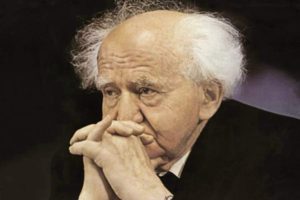
Netanyahu won the election. Will he now dismantle Israel’s democracy?
By Daniel Sokatch / Haaretz
As Benjamin Netanyahu appears set to build yet another extremist coalition, we need to ask how far he could leverage his election win to lead Israel away from democracy.
On Saturday evening, with just three days to go before elections, Netanyahu announced that, should he win, he would begin extending Israeli sovereignty to the West Bank. Doing so would be a calamitous error, a strategic and moral failure.
A move to annex the occupied territories would corrode Israel’s international standing, rupture its relationship with the American Jewish community and likely extinguish any remaining chance for a two-state solution between Israelis and Palestinians. And it could very well mark the beginning of end of Israel as a democratic state.
Netanyahu’s hubris stands in stark contrast to the pragmatism and wisdom of virtually all of his predecessors, left, right and center over the last half century.
Amidst the euphoria that swept the country in the wake of Israel’s victory in the Six Day War of June 1967, a towering figure emerged from self-imposed retirement to warn his fellow countrymen against being carried away by their astonishing success.
The country was celebrating what seemed to be a miraculous victory, having destroyed the air forces and armies of Egypt, Syria and Jordan, and conquered enormous amounts of territory. Suddenly, tiny Israel controlled the Sinai Peninsula, the Gaza Strip, the Golan Heights, East Jerusalem, and the West Bank. Israel emerged from the war a regional superpower in control of territory many times its former size.
And so it must have been quite a shock when this iconic voice told Israelis they had to give it all back.
They could not, he said, keep the territories they had just conquered. Rather, they had to return them as quickly as possible, or risk the destruction of the country they had worked so hard to build. Even if peace was not then achievable, he said, they must give back the territory; otherwise, Israel could not go on being both a democratic and Jewish state. Nobody paid much attention to him then, as the country rejoiced.

If this Israeli leader said those things today, he would likely be branded a self-hating Jew, a “beautiful [sanctimonious] soul” (the Israeli version of “snowflake”), or even a traitor by hardline Israelis. Which would be awkward, because that prophetic voice belonged to none other than Israel’s first Prime Minister, David Ben Gurion, the George Washington of Israel, the country’s most venerated founding father. Ask any Palestinian, and they will tell you that Ben Gurion was no snowflake.
What he said then is still true today, and it has remained the knife hanging over Israel’s future for the past 50-odd years. I call it “Ben Gurion’s Triangle.” After the Six Day War, there were three core elements to Israel’s national identity: Israel was a democracy, Israel was a Jewish state, Israel held all this new territory.
Israelis could choose two, but not all three, of these to keep – and that choice would determine what kind of country Israel would be. If Israel annexed the new territories and made the Palestinians it now ruled full citizens, it would not have a Jewish majority. If it formally incorporated the territories into Israel and denied the Palestinians full citizenship rights, it would no longer be a democracy.
The third choice, the only choice as far as Ben Gurion was concerned, was to remain a democracy and a Jewish state. And the only way to do that was to end Israel’s rule over the territories.
Today, as a result of the unfinished Oslo peace process, the West Bank is divided into three sectors: Area A, a small patchwork of the most populated Palestinian cities containing the majority of the 2.3 million Palestinians living in the West Bank and governed by the Palestinian Authority with the IDF maintaining ultimate control; Area B, an area of joint PA and Israeli control; and Area C, controlled by Israel, comprising over 60% of the West Bank and containing all of Israel’s settlements, including almost 400,000 Israeli Jewish civilians.
The Palestinians and the international community deem those settlements illegal, and every American administration until the current one has considered them illegitimate and an obstacle to peace. That’s because Israel built them, in violation of the Geneva Convention, on land that the Palestinians – and the rest of the world – understand to be the basis of a future state of Palestine in the event of a two state solution.
Annexation of Area C, or of any part of the West Bank in the absence of a peace agreement, would bring Israel to a fateful crossroads: will Israel be democratic and no longer Jewish? Or a non-democratic Jewish apartheid state?
Maybe the Prime Minister’s announcement that he plans to extend Jewish sovereignty is mere election-eve pandering to his nationalist base, provoked by an unexpectedly close election. But we have to take seriously the possibility that the canny prime minister sees a rare opening to realize the old dream of Israel’s right wing, and the number one goal of the settler movement that drives so much of Israel’s policy: annexation of the West Bank.
Certainly he has been emboldened by other ascendant illiberal leaders worldwide with whom he has found much common ground, including President Donald Trump.
Indeed, Netanyahu has said that Trump’s decision to break 52 years of international consensus and recognize Israeli sovereignty over the Golan Heights (captured from Syria in 1967 and annexed by Israel in 1981, a move not recognized by any country in the world), has shown that the time is right to move for annexation.
If Netanyahu does so, it may be the end of Israel as we know it.
It is time for Israel’s true friends, all of those who want to see Israel fulfill its founding vision of being both a Jewish homeland and democratic state – including the leaders of the American Jewish community – to say, loud and clear, that an Israel that ceases to be a democracy, one that permanently disenfranchises and rules over another people, will lose the support of the American Jewish community, the family of democracies and the free world.
Daniel Sokatch is the CEO of the New Israel Fund.

